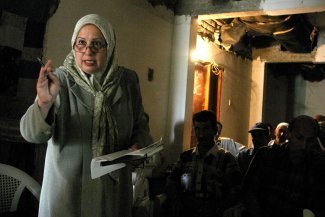The Station makes shared workspace available to young entrepreneurs in Baghdad. A similar space recently opened in Erbil.
In the heart of the bustling city of Baghdad, a wind of optimism is blowing through Iraq’s private sector. As the morning breeze gently awakens the residents of the Karada district, the doors of The Station open to welcome some thirty enthusiastic young students and entrepreneurs, determined to bring their ideas to life and propel their start-ups to new heights.
The Station is much more than just a co-working space; it is the catalyst for an entrepreneurial revolution in Iraq. Founded in 2018 by a group of visionary local investors, the space offers training in 3D printing, drone building and robotics apprenticeships, as well as a venue for hosting all manner of festivals and conferences. It is a stimulating ecosystem where creativity, innovation and knowledge sharing can flourish.
“Since the 1980s, the Iraqi education system has been designed to primarily serve the public sector, in line with the socialist ideology of the Baathist Party. However, despite the fall of Saddam Hussein, this system has failed to adapt to the current needs of the country,” says Ghada Ahmed, head of communication and public relations at The Station.
“It is in this context that The Station strives to change mentalities and fill the void left by an educational system that has become obsolete. Our strategy is based in particular on promoting entrepreneurship and creativity through strengthening the skills of young people in various fields and supporting civil society initiatives,” she adds.
According to article 34 of the Iraqi constitution, education in the country is free. A series of laws introduced in the late 1960s curbed the development of private education and gave the government total control over the education of its population.
While these policies have considerably reduced the illiteracy rate in Iraq – from 50 per cent in the late 1950s to 16 per cent in the early 2000s – a large portion of the population has found itself dependent on public institutions for employment.
The advantages of working in the public sector, which is supported by oil revenues totalling 43 per cent of GDP in 2021, are many and varied. Between a reliable pension scheme and a certain number of days’ paid holiday, the public sector creates unequal competition with the private sector, which cannot always offer such benefits and is thus less attractive to some workers.
According to a 2021 Iraqi Labour Force Survey by the International Labour Organization (ILO), no less than 38 per cent of Iraqis are employed in the public sector, one of the highest rates in the region and in the world.
Informality in the private sector: a major challenge
On the other hand, Iraq’s private sector has suffered greatly from the years of armed conflict since the fall of Saddam Hussein in 2003, followed by civil war and the war against the Islamic State. Today, the country’s entrepreneurial landscape is comprised of a mosaic of small and medium-sized enterprises that contribute, to a greater or lesser extent, to the country’s economic landscape.
“These multiple crises have created a climate of uncertainty that has strongly deterred investors from taking risks and getting financially involved in the national economy,” says Maha Kattaa, ILO country coordinator for Iraq.
Furthermore, the process of registering a business in Iraq is often cumbersome and bureaucratic, which discourages many entrepreneurs, who prefer to operate informally rather than deal with tedious administrative procedures. Closing a business is also a complicated and costly ordeal that prevents business owners from ending unprofitable ventures.
“The entrepreneurial environment in countries like Iraq is not very conducive to business creation. People prefer to work informally, take risks, but avoid all the paperwork that takes up a lot of time and resources,” Kattaa tells Equal Times.
At the same time, the government’s lack of resources, particularly in terms of labour inspectors, limits its ability to extend coverage to small and medium-sized enterprises, which further discourages individuals from registering and complying with legal standards.
As a result, no less than 54.8 of Iraq’s working population is employed in the informal sector. This contributes to the casualisation of many people who work on fixed-term contracts and are often denied access to social security. In addition to restricting the government’s ability to collect tax revenues, private sector informality also reduces the potential for business growth and expansion.
Government reforms to make the private sector more attractive
However, the government is becoming increasingly aware of the need to reform this system. As early as 2014, it published a strategy for the development of Iraq’s private sector through 2030, which not only describes the current state of the private sector but also serves as a roadmap for implementing various policies. The government aims to ensure that between 2023 and 2030 the private sector accounts for at least 60 per cent of GDP and absorbs 4 per cent of unemployment.
More recently, in May 2023, the Federal Iraqi Council of Representatives passed a law on social security for private sector workers, considerably extending the legal coverage of the social security system for various types of informal and self-employed workers. In particular, this law grants rights to maternity and unemployment benefits, as well as health insurance, representing a major advance for workers’ rights in the country.
“Today, the environment is much more conducive for start-up creation with the government encouraging more young people to launch their projects and register their businesses than before,” says Labeeb Kashif Al-Gitta, a 35-year-old entrepreneur and chairperson and CEO of Al-Nakhla, a company specialising in palm tree maintenance.
These reforms are also needed to help meet the country’s current demographic challenges. With 40 per cent of the population under the age of 25, it is becoming increasingly difficult for the public sector to absorb all the available labour.
According to the World Bank, no less than 34.5 per cent of the young working-age population is unemployed. This has fuelled social discontent and in 2019, Iraq was rocked by major protests, with young people at the forefront demanding a change in the system they viewed as corrupt, more job opportunities and better public services.
As Kattaa stresses, reforms must also be inclusive, as a large proportion of young women of working age do not have access to employment.
“Women’s participation rate in the labour market is only 10.5 per cent, one of the lowest in the region, if not the Asian continent,” she says. “The majority of them are in the public sector. According to our estimates, there are only a few hundred thousand working in the private sector, while we have 13 million women of working age in the country.”
Despite challenges, a promising economic future for the private sector
Back at The Station, the morning light floods into the vast open spaces. It’s only 10 o’clock in the morning and the co-working space is already buzzing with activity. The start-ups here, which represent a variety of sectors, from technology and agriculture to commerce and services, share a common passion: contributing to the development of the private sector for Iraq’s economic future.
“By starting my business, I want to bring positive change to my country, my community and show my loved ones that it is possible to be successful with just an idea and the necessary resources,” says Mohammad Al-Bayati, 35, who created Zulitak, a company that weaves high-quality hand-woven rugs made from the personal images of its customers.
After decades of conflict and instability, Iraq is currently experiencing a relative political and security lull, opening up new prospects for the private sector, which can develop more securely than ever before. “When we started our business in 2018 specializing in palm maintenance, we only had about 20 trees. Today we have almost 7,000 palm trees to take care of and we plan to expand even more,” says Al-Gitta.
This new economic landscape in Iraq is also reflected in the growing interest of foreign investors. In June 2023, Qatar announced its intention to invest US$5 billion over the next few years, while Saudi Arabia and the United Arab Emirates (UAE) signed an agreement that same month to allocate US$6 billion to support commercial and infrastructure projects in the country.
Despite this positive momentum in the private sector, many challenges remain. Problems such as access to traditional financial institutions, which often have strict procedures and an aversion to risk, or the lack of infrastructure linked to transport logistics, internet connections and energy supplies can hamper the growth of start-ups.
“The logistics system is not developed enough for us to be able to mass produce and be able to send orders all over the world at a decent price. That’s why we also opened a branch in Turkey to help us with the logistics process,” says Mohammad al Bayati.
He concludes: “Despite all these challenges, I see around me that young Iraqis are very motivated and have a lot of potential. I am sure that if investors give us a chance, Iraq will be a real regional hub for the private sector”.













